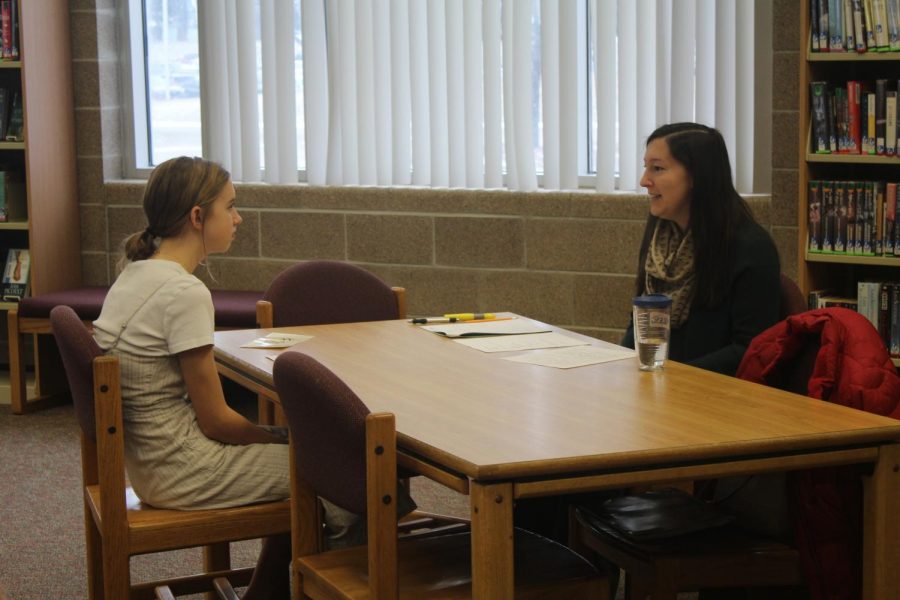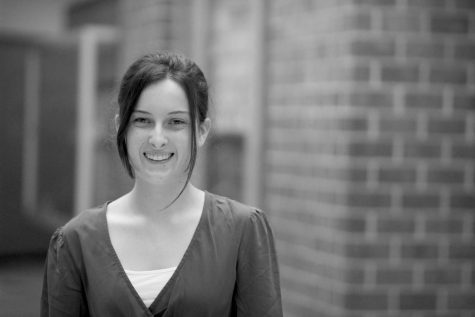Applying for the Future
A look into mock job interviews
December 6, 2018
Shaking hands. Sweaty palms. Racing heart. These are symptoms all 150 students faced on Thursday, Nov. 29 before completing their mock job interviews, a district graduation requirement fulfilled through the completion of an oral communications class.
Interviews are held in the library four times a year: Sept. 20, Nov. 29, Feb. 7 and April 25. Students spend about one total week on this unit, but it is broken up over multiple half days. They learn about everything that goes into a perfect interview: a polished resume, a lasting first impression and how to think on their feet when answering questions.
Mock job interviews serve as a way to give students a chance to experience what an interview is like before they do a real one for a job or college.
“Personally, I think this is one of the best lifelong skills students get in Millard,” speech teacher and mock job interview coordinator Jennifer Jerome said. “Last year they were in talks to take it away. Myself and the other speech teachers were adamant that this is something Millard is doing 1000% right for our students.”
Students must choose a position and they wish to apply for and complete an application, resume and compile a list of references. On the day of the interview, students are expected to dress professionally and arrive prepared five minutes early.
At the start of the unit, students receive a packet of information containing articles ranging from understanding non-verbal communication to the importance of a proper handshake. To further prepare the students, Speech teachers simulate the interview experience by having students practice answering questions in pairs, discuss proper dress and show videos of past interviews.
“I want my students to learn to feel comfortable in a different communication setting,” Jerome said. “A really great compliment is when they’re juniors or seniors or I see them out and about after high school graduation and they say ‘I totally used all my stuff from the mock job interview to get my job.’”
Over the years, Jerome has compiled a master spreadsheet with the names and contact information of community members and payback partners who return each semester to serve as interviewers.
“‘The most gratifying experiences for me are connecting with students who have future plans but are not sure how to pursue their career choice,” interviewer Barb Haar Rightmyer said. “Being a retired interviewer, I have life stories that are probably helpful for students. My voice is also different than their parents, and I think they may consider my thoughts because I don’t have any particular agenda for them.”
Interviewers fill out a rubric with three categories students are evaluated on: application, resume and interview performance, which is broken into three sections-nonverbal communication, vocal delivery and information. Everything from facial expressions to speaker volume is evaluated.
“Preparation and practice are always key no matter the experience level,” attorney and interviewer Matthew Watson said. “Hopefully, they will learn from the experience and absorb and implement the feedback so they are better polished, prepared and composed when the interview really counts.”
After the interview, students receive their completed evaluation where strengths and weaknesses for each category are noted from the interviewer with a final, overall evaluation, with a recommendation to hire or not hire.
“I was very nervous about possibly saying something wrong or having bad posture, but mostly I was nervous about what they would ask me,” freshman Laritza Rodriguez said. “Afterwards, I was mainly relieved that everything went well, and I found this confidence in me.”
Relaxed muscles, an air of confidence and an overall sense of relief are feelings of students as they leave the interview table and head back to class to write a thank you note and complete their final reflection.







